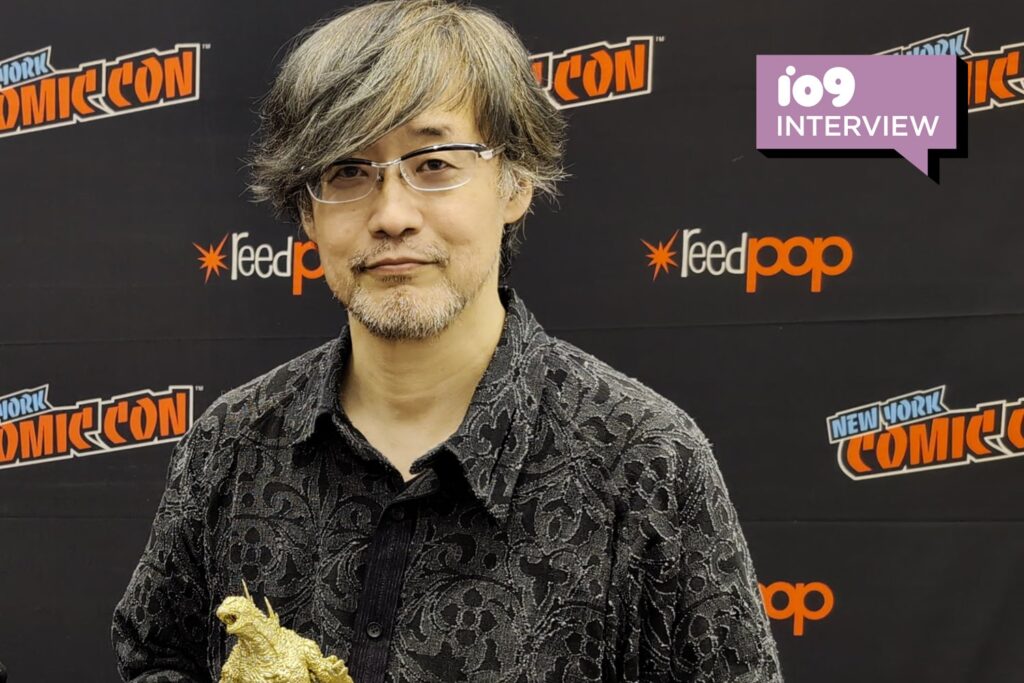Godzilla may be the King of all Kaiju, but right now even the Big G himself has royalty above him: Takashi Yamazaki, the man who shepherded Toho’s legendary monster to one of his biggest and most successful years in 2023 with the record-breaking release of the incredible Godzilla Minus One. Since it smashed critical and commercial records for international film, Yamazaki has been on a windswept tour of the world to rub shoulders with Hollywood royalty, represent Minus One for its historic Oscars win, and now, on the eve of the franchise’s 70th birthday on November 3, he’s announced that he will return to direct a brand new Godzilla movie.
“If you look at the history of the Japanese Godzillas, the last one, Shin Godzilla, directed by Hideaki Anno, and even mine, I felt like the bar had been set pretty high after what [Anno] had done,” Yamazaki told io9 (via translator) while attending New York Comic Con, ahead of a panel discussing Godzilla Minus One‘s impact on the franchise… and dancing around that he would be continuing his Godzilla legacy with the then-unannounced new film. “Now that it’s between Shin Godzilla and Minus One, whatever Godzilla comes next, the bar is going to be set really, really high. But I think that there are going to be young enough creators to be up to the challenge that can take the franchise into the next generation, whatever that looks like.”
Read on to hear Yamazaki’s thoughts on the global appeal of Godzilla in all its forms (both from Toho and Legendary), how he made his Kaiju epic on the fraction of the budget of most Western blockbusters, and, of course, his Kaiju Fashion Icon Moment on the red carpet earlier this year with those glorious Godzilla claw shoes.
This interview has been edited and condensed for clarity.
io9: How do you feel about the Western appreciation of Godzilla after everything you’ve experienced with Minus One this past year?
Yamakazi: I feel very good about the Western appreciation of Godzilla in general. I think Godzilla, and what we were able to do with Godzilla Minus One, really showed that there are so many layers, and that there’s thematic depth that we can to a Kaiju movie—I think that gave older generations something to think about, a cerebral core concept, but I think that extends to families as well, spanning generations. It gave people something to discuss and talk about the different themes that were in Minus One, so I think that helped change the perception of Godzilla as a whole.
io9: A lot’s been made over here about how you achieved the film’s visual effects on such a different budget compared to American blockbusters. What were the challenges in executing the scale of your vision in that regard?
Yamakazi: I know [Minus One’s] budget seems really humble compared to Hollywood productions, but if you look at the Japanese live-action movie scene, it was actually top-tier in terms of our movie budgets. We were able to access one of the biggest and best teams that Japan had to offer. I think another reason is also, because it was Godzilla that we were dealing with, everyone bought a little extra to the table, maybe 50% more than normal. “Oh, if it’s Godzilla, I’m going to try a little harder, I think we can push the boundaries a little further.”
For me personally as well, working on Godzilla at this caliber is really one of my lifetime goals. Being able to achieve that really lit a fire, and sparked something within the whole team. That, and being able to tap into one of the biggest Japanese budgets that we could, enabled us and empowered us to bring the movie to where we wanted it to be.
io9: Is there anything you would’ve done differently with an American budget?
Yamakazi: It’s really tough to look back on a film that’s complete and say “Oh I wish I could’ve done this or that differently,” if only because within the constraints that we had, everyone really brought their A-game. I don’t need a Hollywood budget, but if we had more, there were things that perhaps would’ve made the working environment and conditions run better. There were different things we could’ve done, minor things that made it slightly different. But I wouldn’t go back into the film and say “Hey, I could’ve changed this or do that differently.” I think we did our best, the best that we could… that said if there was one thing, I wish we could’ve filmed it in full resolution for IMAX!
io9: One of the wildest things to come out of your Oscars appearance was you and your team’s Godzilla claw heel shoes, which they now sell. How did they come about, and how do you feel about being a Kaiju fashion icon now?
Yamakazi: The producer on our film had actually worked with the brand and helped design something else on a different project, and said, “Why don’t we do this for Godzilla as well?” That was the initial inception of the entire project. The brand, ha | za | ma, they made these amazing shoes that were brought to the Oscars. Sometimes when I was on the red carpet, I thought “I’m going to take pictures of my shoes more than they take pictures of me!” It was so interesting. But again, seeing a Japanese fashion brand like that have a platform at the Oscars, and take it all the way from this one-off thing to something fans can now buy, and interact with Godzilla in that way, was a really cool journey to watch.
io9: Godzilla is everywhere in the world right now—Minus One, the Legendary movies, the Apple TV+ show. Where do you think Godzilla goes from here? What does the series need to do to thrive and keep evolving?
Yamakazi: To be frank, I’ve seen Godzilla through many different ages. I’ve seen him withstand winters, so to speak, where the franchise was kind of like “where is this going to go?” But if you look at the landscape right now, to your point between Minus One, Godzilla x Kong, and Monarch, I think that is exactly the kind of balance Godzilla needs as a franchise to withstand the next 10, 20, 30 years. The fact that it can be so diverse and be open to many different interpretations, it’s all still unified under this umbrella that is Godzilla. I think that’s what makes its so strong, but at the same time, you’re not overusing or underusing the series—if you milk it too hard, that would lose the audience’s trust. Making sure you control that balance, while allowing creators to have enough freedom to do what they need to do, is going to be very important for the future of Godzilla.
If you look at the history of the Japanese Godzillas, the last one, Shin Godzilla, directed by Hideaki Anno, and even mine, I felt like the bar had been set pretty high after what [Anno] had done. Now that it’s between Shin Godzilla and Minus One, whatever Godzilla comes next, the bar is going to be set really, really high. But I think that there are going to be young enough creators to be up to the challenge that can take the franchise into the next generation, whatever that looks like.
io9: One last question: what’s your favorite Kaiju film?
Yamakazi: War of the Worlds by Steven Spielberg. It was a huge culture shock for me when I saw it for the first time. Wow, it’s so good. I don’t know if that falls into the traditional Kaiju genre, but I think it does.
Godzilla Minus One is available to stream and purchase both digitally and on physical Blu-ray and DVD releases now, and its black-and-white Minus Color re-release is now in theaters for a limited time to mark Godzilla’s 70th anniversary.
Additional reporting by Adriano Contreras.
Want more io9 news? Check out when to expect the latest Marvel, Star Wars, and Star Trek releases, what’s next for the DC Universe on film and TV, and everything you need to know about the future of Doctor Who.


